FREELY FRAYED
FREELY FRAYED by Don Mee Choi
Publication: September 1, 2026
US Paperback edition: ISBN 979-8-89106-046-3, Wave Books #128
UK/EU edition: TBA , And Other Stories
MIRROR NATION
Available Wave Books, 2024
Elegiac and haunting, Mirror Nation by Don Mee Choi completes the KOR-US trilogy, along with Hardly War and the National Book Award–winning DMZ Colony.
Much like Proust's madeleine, a spinning Mercedez Benz ring outside Choi's Berlin window prompts a memory of her father on the Glienicker Bridge between Berlin and Potsdam, which in turn becomes catalyst for delving into the violent colonial and neocolonial contemporary history of South Korea, with particular attention to the horrors of the Gwangju Uprising of May 1980. Here, photographs, news footage, and cultural artifacts comingle with a poetry of grief that is both personal and collective. Inspired by W. G. Sebald and Walter Benjamin as well as Choi’s DAAD Artists residency in Berlin, Mirror Nation is a sorrowful reflection on the ways in which a place can hold a “magnetic field of memory,” proving that history doesn’t merely repeat itself; history is ever present, chiming the hours in a chorus against empire.
Winner of 2025 Firecracker Award - CLMP
Judges’ Citation:
“Don Mee Choi’s Mirror Nation is a virtuosic work exploring memory, loss, and grief inside the system of capitalist nation-states. Choi rearranges and expands language(s), numbers, signs, still and archival images in a project so singular that it expands the definition of poetry itself as it charts a poignant journey of meaning-making in the aftermath of empires’ repeated cycles of violence. Mirror Nationoffers the best of what poetry can provide—a new way of seeing. Once you have read it, it will live in you and with you for the foreseeable future. Arriving at a crossroads in the American colonial project, this collection is both testament and testimony to the corrosive forces of empire.”
Shortlisted 2025 PEN-Heaney Prize
Judges’ Citation:
‘Don Mee Choi’s Mirror Nation is the last in her trilogy of works that combine poetry, documentary, photography and philosophy to create art of astonishingly radical and political potential. Choi’s father was a photographer, whose job took him to zones of conflict and unrest. In Mirror Nation Choi counterpoints the history of two divided nations, Germany and Korea, through her father’s photographs. The resulting work comments on the philosophy of history with rare lyric grandeur.’
Reviews:
Choi’s trilogy is constantly on the move, and, again, this is a question of form as much as content… This isn’t a thought or aesthetic experiment; it’s a means of survival and thriving. — Alan Gilbert, “Disperse the Nation: Don Mee Choi’s Poetry Trilogy,” e-flux Journal
For Choi, disruption is necessary to understand the ways we navigate to the past and future from a moment in time. Photography and text are, for Choi, the two mirror forms of language through which to mediate the self in the world: Without either, Choi cannot make coherent language, nation, parents, or self… Asking what it means to live a life where war haunts everything, Choi’s trilogy answers her question by using both literary rupture and formal rupture. — Vika Mujumdar, “Without the Poet, There Is Only War,” Public Books
Across Mirror Nation, Choi shifts her focus from individual linguistic dislocation to the semantics of empire. She lingers on the cyclical nature of colonial conflict, the division of history into that which can be mourned and that which must be forgotten. In plain terms she describes this phenomenon, stating, “Grief has a tendency to migrate from clock to clock, war to war, massacre to massacre, colony to neocolony.” — Annabelle Johnson, LARB
Don Mee Choi draws on friendships, literature and documentary materials to elucidate the personal griefs we suffer under the assaults of empire. Formally explosive and emotionally harrowing, Mirror Nation is a riveting investigation into the coded images that fuse memories of different times and places. — Forrest Gander, The Poetry Society
Throughout the new book, Choi pays homage to other writers and artists who have influenced her work and Mirror Nation in particular. She quotes W.G. Sebald on “the silent lament of the angels, who have kept their station above our endless calamities for nigh on seven centuries” (Vertigo). There are references to Frantz Fanon, for his writings on post-colonialism, and to W.E.B. Du Bois, a co-founder of the N.A.A.C.P., who studied in Berlin in the 1890s. Walter Benjamin is invoked, of course, since Choi clearly abides by his belief of involuntary memories. But the presiding figures that hover over this book are the angels from Wim Wenders’ 1987 film Wings of Desire, his love letter to Berlin and to the angels that watch over that city. — Terry Pitts, VERTIGO
The rewards across the three volumes in concert manifest not only through the cumulative effects of evidentiary fragmentation collaged in documents and reflections and photographs, but the collisions of tones, both typographical and textual. Choi draws in Franz Fanon, Judith Butler, W.G. Sebald, Walter Benjamin, and W.E.B. Du Bois; from the latter, she riffs and marks the global and personal cleavings at the hands of empire: “My twinness manifests within unreasonable destiny, vast homesickness. My twin self has my comb.” — Rebecca Morgan Frank, LITHUB
Choi quotes Walter Benjamin (“One of the great attractions of the travel scenes found in the Imperial Panorama was that it did not matter where you began the cycle”) as part of the spectacular mosaic of headlines and fragments she juxtaposes to place the events in a larger context of contemporaneous global neocolonial violence, including the 1980 Miami riots in response to the acquittal of four police officers who beat a Black man to death after a traffic stop. — Publishers Weekly
Poetry often rings true as a moment for the individual voice to serve as beacon, but as with Choi’s previous works, that which mesmerizes and heals is the synthesis of the collective: that what was truly lost is not gone, has not disintegrated into any absolute or finality. Contemporary archival and translation work and the poet’s love for her father connect the abyss of violence to a relief and emergence found in the poetry of Mirror Nation. — Greg Bem, The International Examiner
...Don Mee Choi is perhaps the most subversive. Her last three collections Mirror Nation (Wave Books, 2024), the National Book Award-winning collection DMZ Colony (Wave Books, 2020), and Hardly War (Wave Books, 2016) blend documents from her family’s experience with photography, memoir, and history. -- William Lessard, Jacket 2
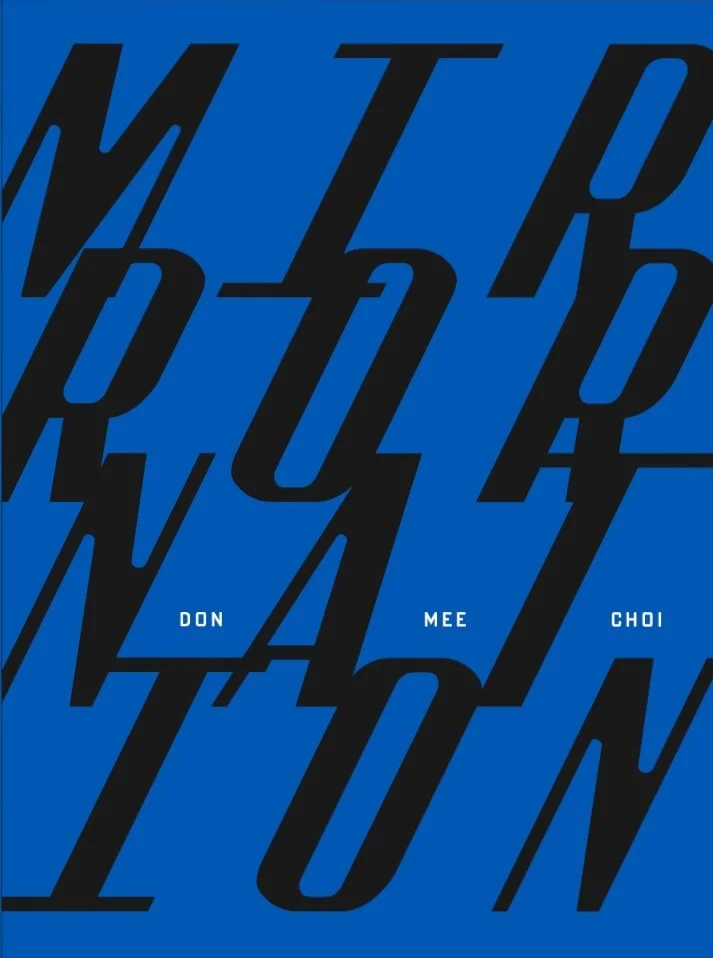

Mirror Nation
UK & Europe: available from And Other Stories, 2025
Winner of the 2025 Firecracker Poetry Award
Shortlisted for the 2025 PEN Heaney Prize
Much like Proust’s madeleine, a spinning Mercedes Benz ring outside Choi’s Berlin window prompts a memory of her father on the Glienicker Bridge between Berlin and Potsdam, which in turn becomes catalyst for delving into the violent colonial and neocolonial contemporary history of South Korea, with particular attention to the massacre by Korean government forces of hundreds of students taking part in the Gwangju Uprising of May 1980. Here, photographs, news footage, and cultural artefacts commingle with a poetry of grief that is both personal and collective. Inspired in part by W. G. Sebald and Walter Benjamin, Mirror Nation is a sorrowful reflection on the ways in which a place can hold a ‘magnetic field of memory’, proving that history doesn’t merely repeat itself; history is ever present, chiming the hours in a chorus against empire.
Reviews:
Citation for shortlisting in the 2025 PEN Heaney Prize:
‘Don Mee Choi’s Mirror Nation is the last in her trilogy of works that combine poetry, documentary, photography and philosophy to create art of astonishingly radical and political potential. Choi’s father was a photographer, whose job took him to zones of conflict and unrest. In Mirror Nation Choi counterpoints the history of two divided nations, Germany and Korea, through her father’s photographs. The resulting work comments on the philosophy of history with rare lyric grandeur.’
‘Don Mee Choi draws on friendships, literature and documentary materials to elucidate the personal griefs we suffer under the assaults of empire. Formally explosive and emotionally harrowing, Mirror Nation is a riveting investigation into the coded images that fuse memories of different times and places.’
Rebecca Morgan Frank
Lit Hub
‘The rewards across the three volumes in concert manifest not only through the cumulative effects of evidentiary fragmentation collaged in documents and reflections and photographs, but the collisions of tones, both typographical and textual.’
Publishers Weekly:
‘From Ethiopia to Israel, Nicaragua to Afghanistan, she ties headlines and fragments using the equal sign, which she refers to as “a syntax that enables multiple places and times to coexist simultaneously.” Choi skilfully illustrates the cyclical, endless nature of violence to more deeply understand her home, herself, and the world.’
Anabelle Johnston
Los Angeles Review of Books:
‘Choi has demonstrated her dutiful attention to language in her previous work as a translator and poet, but what compels me in this collection is her sustained, universal critique of violence in and beyond national bounds.’
Terry Pitts
Vertigo:
‘Choi, at the end of Mirror Nation, understands that she, too, is a divided country, a political person and a family person, one person who is consumed with history and grief and another person who stops to marvel at sparrows and swans.’
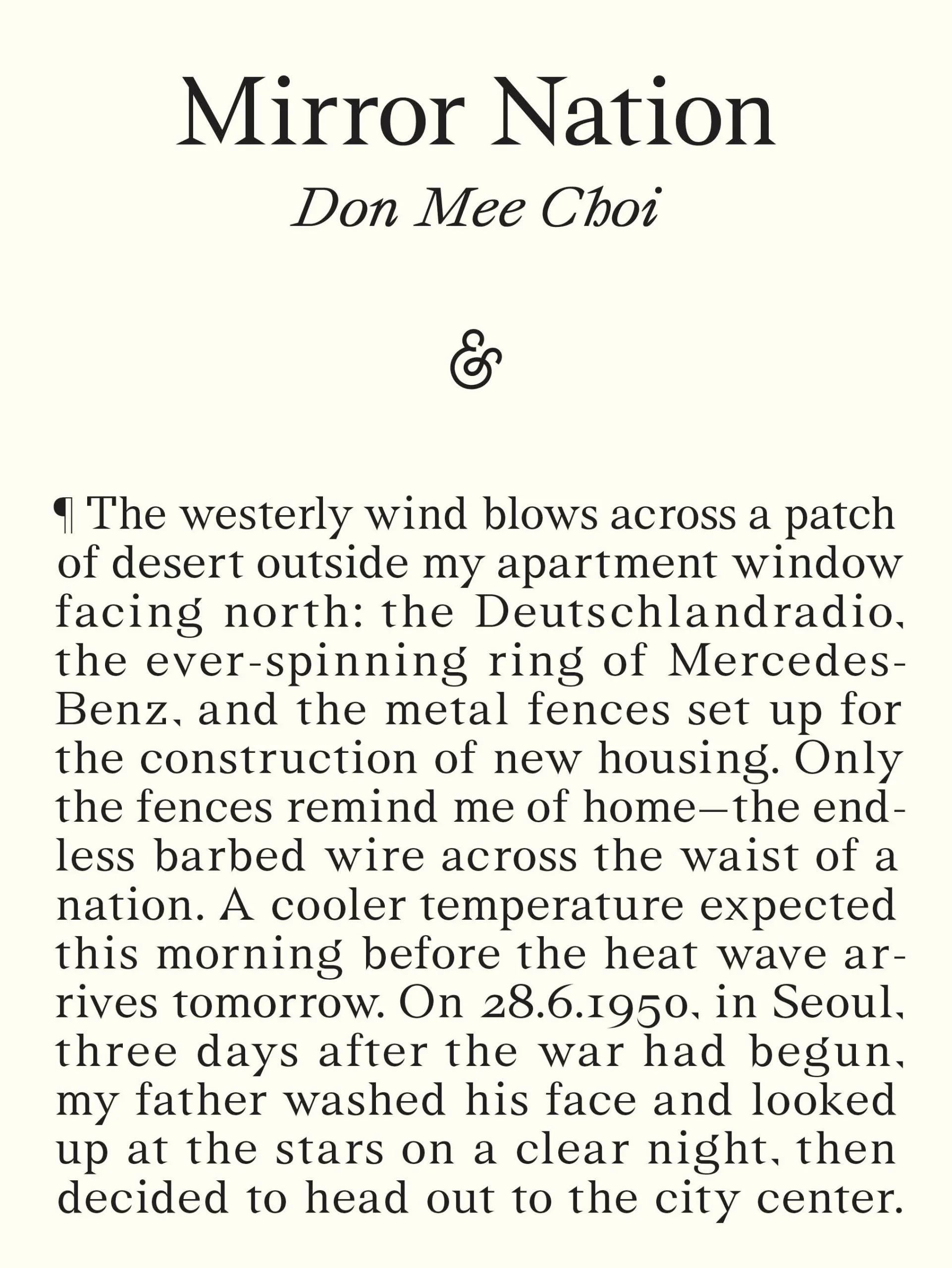
DMZ COLONY
Available from Wave Books, 2020
Woven from poems, prose, photographs, and drawings, Don Mee Choi's DMZ Colony is a tour de force of personal and political reckoning set over eight acts. Evincing the power of translation as a poetic device to navigate historical and linguistic borders, it explores Edward Said's notion of "the intertwined and overlapping histories" in regards to South Korea and the United States through innovative deployments of voice, story, and poetics. Like its sister book, Hardly War, it holds history accountable, its very presence a resistance to empire and a hope in humankind.
Winner, National Book Award for Poetry
Judges Citation: “Don Mee Choi's urgent DMZ Colony captures the migratory latticework of those transformed by war and colonization. Homelands present and past share one sky where birds fly, but “during the Korean War cranes had no place to land.” Devastating and vigilant, this bricolage of survivor accounts, drawings, photographs, and hand-written texts unearth the truth between fact and the critical imagination. We are all “victims of History,” so Choi compels us to witness, and to resist.”
Finalist, The 2021 T.S. Eliot Four Quartets Prize, Poetry Society of America
Reviews:
Choi’s snow geese are themselves the living memory of exile when in the opening pages of DMZ Colony she sees a flock of them migrating at the 38th parallel where it crosses St. Louis, Missouri. Choi then turns this literal and figurative image of snow geese into a drawing of the letters D, M, and Z via a process of tracing a sketch she made of them flying (all three books contain drawings by Choi, which augments their hybrid and mixed-media quality). A trace of a trace. “Memory’s memory.” — Alan Gilbert, e-flux Journal
“Here that awareness is embodied in disjointed and dreamlike dialogue and the coming together of both languages in one fractured twin-self… The result is a book for our age, a radical (in that it builds from the roots out) philosophy, a new angel of history backing away slowly from the wreck of the century.” — Sasha Dugdale, PN Review
We can view Don Mee Choi as a kind of bricoleur in DMZ Colony; a quilt maker, image assembler, improviser, who uses multiple tools – research, fiction, memoir – to assemble the beginnings of an archive. “See You At The DMZ” — May Ngo, Sydney Review of Book
“‘Cruelty and beauty—how do they coexist?’ Don Mee Choi asks this question in the middle of her book DMZ Colony. To say that she answers that question is not quite right. What Choi does is harder: she gives us new ways to think it through—she creates a vocabulary, syntax, multiple codes, maps, and sounds so that we can enter specific devastations, see how they weave, like all colonial disaster, backward and forward in time.”—Jennifer Kronovet, Poetry Daily
"Reading Don Mee Choi’s DMZ Colony is an experience that plunges into a theatre of words, a theatre of pain in which words are everything… The poet’s presence moves among history, like a phantom without a face… each reading of DMZ Colony enacts a transition of history from within, which calls for individuals to break the silence—the last and the most essential border one can carry."—Pareys Liu Yiyi, Cha Journal
“Though many translators’ careers can be characterized as sustained exercises in twinning – a translator and a writer speaking at once, their identities intertwined – Choi’s is a particularly salient example.”—April Yee, The Times Literary Supplement
“DMZ Colony is nothing if not a work of documentary poetics, taking its place in a lineage that encompasses Charles Reznikoff’s Testimony, Muriel Rukeyser’s Book of the Dead, and Ezra Pound’s Malatesta Cantos… Choi’s DMZ Colony is a haunting and intricately woven recounting of horrors that is shot through with affection and utopian aspiration.” — Mark Scroggins, Hyperallergic
“The way Choi yields to Ahn’s voice while bringing out its aesthetic dimension reminds me of the stories in The Emigrants by W. G. Sebald.” — Jae Kim, Los Angeles Review of Books
“Choi’s words point us toward a world beyond the American imagination. A world in a perpetual state of war—or at the brink of it—that I, or you, are detached from and entangled with. Who are the people forced to leave their homelands? Who are the people with wings, flapping incessantly in foreign countries, unwelcomed and unable to land?” — Woogee Bae, Poetry Northwest
“Choi’s poetry is an act of collective witness, a testament to the power of remembrance in honoring the past while orienting ourselves toward the future.” — Isabella B. Cho, The Harvard Crimson
“Choi’s innovative use of language and structure invites readers to reconsider the narratives surrounding war and its enduring impact on individuals and nations. Through both books, Choi offers a poignant, piercing, yet intelligent re-consideration of personal and political landscapes shaped by extreme conflict, and that makes reading these incredibly affecting.” — Man Jones, BUZZ, Wales, UK
“Overlapping memory always longs for return, the return of memory,” writes Choi. But memory cannot return to the original site of meaning. It can only return to its after-image, the image displaced from the original (i.e. the repetition of the word foreign).— Alina Stefanescu, On the Seawall
“Angels are in important image to end on: both ethereal and earthly, at once dead and living, here and not here. Where ghosts are passive, angels are active. They also take our minds back to the migrating birds, sharing with them both wings and the habit of crossing and returning between realms – the wings also represent twoness, twins or two mirrored halves. It is astonishing that Choi is able to combine so many of the complex strands of these books in a single symbolic figure, but in the figure of the angel she achieves just that.”— Chris Edgoose, Wood Bee Poet
“And everywhere, everywhere there are birds and wings: a “language of return,” both calling Choi back to the place of her birth and reflecting her artistic and personal migration.” —Ian Maxton, Spectrum Culture
“There is a hopefulness to her poetry, one that includes the possibility of transcendence and flight, but it is grounded in a deeply macabre reality.” — Kion You, The Los Angeles Review
“ a poetry book taking on the crimes of imperialism” — Editor’s Choice, NY Times Books Review
“DMZ Colony is, in the Barthesian sense, a writerly text.” —John Wall Barger , Rain Taxi Review, Summer 2020
“Virtuosic in its range and empathy, this is a book that shifts the reader’s understanding of historical narrative from one of war to one of flight.” A starred review in Publishers Weekly
“DMZ Colony is a gestalt project…structured yet tangled, leading the reader forward while speaking from all sides.” —Madeline Vardell, The Arkansas International
“This way of seeing, at once prophetic and hardboiled, weaves through all her poetry, including her latest book, DMZ Colony (Wave Books, 2020), the second in her trilogy…. If Hardly War is at root a familial meditation—Stephen Sohn, an English professor at the University of California, Riverside, describes the work as a "salvage project" of the Korean War generation—then DMZ Colony extends the inquiry to more bodies, places, and times.”—E. Tammy Kim “Long Division,” Poetry Foundation
“‘The language of capture, torture and massacre is difficult to decipher,’ writes the eminent Seattle-based translator and poet, and yet she has made an oeuvre from the attempt.”— Stephanie Burt, Academy of American Poets
“Choi’s DMZ Colony is as much an entity as it is a place, a meta-discursive domain wherein its throng of unlikely inhabitants—endangered birds, political prisoners, orphans, refugees, all colonized subjects and outcasts of empire—are alternately declared and concealed. Collectively, they indeed amount to a colony of sorts, one that thrives off its own premise. It is the necessarily speculative nature of the DMZ, which bars all forms of material access, that provides the opportunity and very basis for Choi’s translational mode. That mode, in turn, gives voice, and makes real imagined worlds.”—Jed Munson “Translation as Mode in ‘DMZ Colony,’” Chicago Review of Books




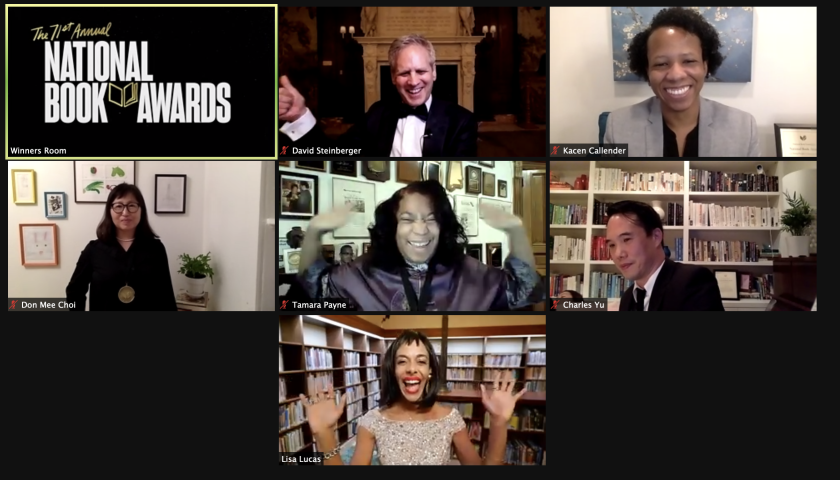
DMZ Colony
UK & Europe: available from And Other Stories, 2025
Winner of the National Book Award (USA)
‘I decided to translate the stories of eight girls who survived the Sancheong-Hamyang massacre, which took place in Gyeongsangnam-do, a southern province of South Korea, in 1951. My decision to translate the girls’ stories wasn’t entirely mine alone. It can take billions of years for light to reach us through the galaxies, which is to say, History is ever arriving.’
Woven from verse, prose, photographs, historical reports, typographic experimentation, drawings and more, DMZ Colonyexplores Edward Said’s notion of ‘intertwined and overlapping histories’ in regards to South Korea and the United States. At the start, the call of geese in the American sky translates into the letters D, M and Z, calling her back to her country of birth, Korea. She travels to a traditional village in the DMZ, the demilitarised zone, on the border of North and South Korea. There she interviews an old man who, although tortured brutally for many years, didn’t give up his belief in Communism. The artful use of the oral history genre continues as she gives voice to orphan survivors of a government massacre. In a language of haunting and suggestive construction, increasingly words give way to her father’s documentary photos from the time of General Park Chung Hee’s brutal putsch and dictatorship, a regime supported by the USA.
Like its sister books in Choi’s highly acclaimed KOR-US trilogy (Hardly War and Mirror Nation), DMZ Colony holds history accountable, its very presence a resistance to empire and a hope in humankind.
Reviews:
Judges’ citation, Winner of the National Book Award (USA)":
‘Don Mee Choi's urgent DMZ Colony captures the migratory latticework of those transformed by war and colonization. Homelands present and past share one sky where birds fly, but “during the Korean War cranes had no place to land.” Devastating and vigilant, this bricolage of survivor accounts, drawings, photographs, and hand-written texts unearth the truth between fact and the critical imagination. Choi compels us to witness, and to resist.’
Sasha Dugdale
PN Review:
‘Here that awareness is embodied in disjointed and dreamlike dialogue and the coming together of both languages in one fractured twin-self… The result is a book for our age, a radical (in that it builds from the roots out) philosophy, a new angel of history backing away slowly from the wreck of the century.’
Publishers Weekly, starred review:
‘Virtuosic in its range and empathy, this is a book that shifts the reader’s understanding of historical narrative from one of war to one of flight.’
April Yee
Times Literary Supplement:
‘Though many translators’ careers can be characterized as sustained exercises in twinning – a translator and a writer speaking at once, their identities intertwined – Choi’s is a particularly salient example.’
May Ngo
We can view Don Mee Choi as a kind of bricoleur in DMZ Colony; a quilt maker, image assembler, improviser, who uses multiple tools – research, fiction, memoir – to assemble the beginnings of an archive. “See You At The DMZ” —
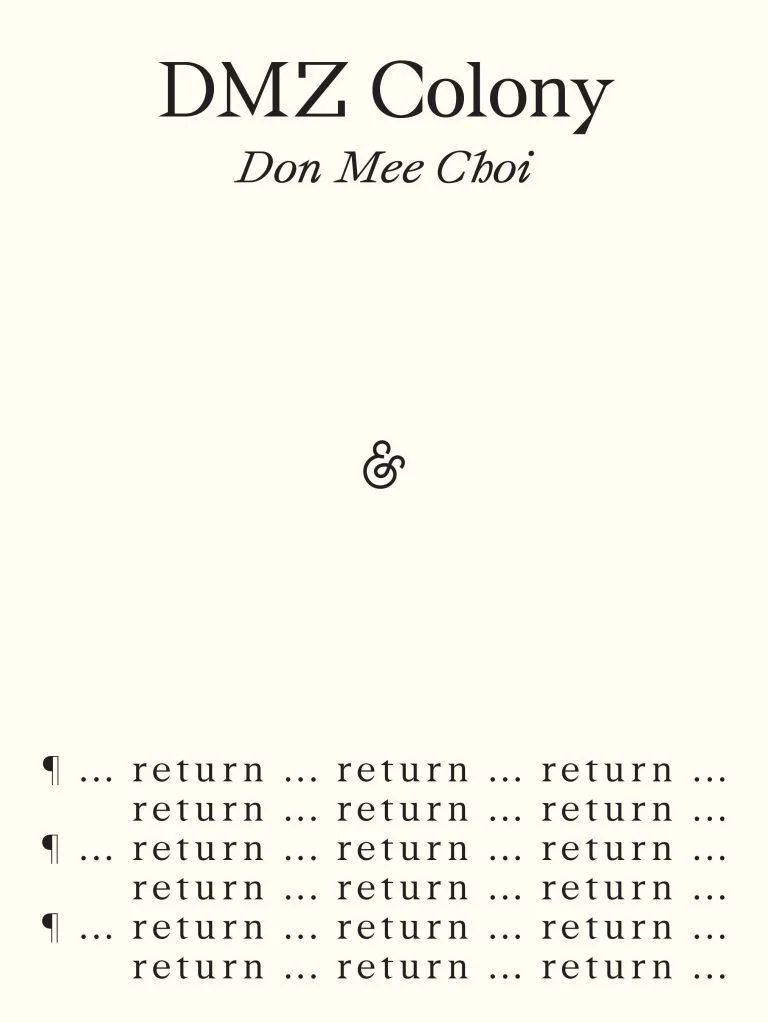
Hardly War
Published by Wave Books (2016)
Hardly War, Don Mee Choi's major second collection, defies history, national identity, and militarism. Using artifacts from Choi's father, a professional photographer during the Korean and Vietnam wars, she combines memoir, image, and opera to explore her paternal relationship and heritage. Here poetry and geopolitics are inseparable twin sisters, conjoined to the belly of a warring empire.
Reviews:
"Deliberately and excitingly difficult in both its style and its subject matter, Don Mee Choi’s second collection, “Hardly War,” sees its author operating as an archaeologist as much as a poet. Choi’s use of hybrid forms — poetry, memoir, opera libretto, images and artifacts from her father’s career as a photojournalist in the Korean and Vietnam Wars — lets her explore themes of injustice and empire, history and identity, sifting through the detritus of family, translation, propaganda and dislocation." -- by Kathleen Rooney in NYTIMES Book Review
“This is not a retreat from reality, but a device to expose the colonialist infantilisation and othering that precedes conquest, war crime and genocide. This is a devastating UK debut, speaking its own faint history in its own faint language, and taking us inside a hidden war whose repercussions are still unfolding today.” — by Philip Terry, The Guardian
Choi’s trilogy repeatedly breaks the language of command and hierarchy; Hardly War is filled with muddled military language… Choi’s father is a direct witness to military and police violence, while she engages with the machinations of dominant ideologies and representations, which—like the BBC News—aim to appear “naturally convincing” so as to lodge themselves in everyday life and receive an easy embrace. — Alan Gilbert, e-flux Journal
“This is her “hardly war,” her “faint history<‘ made up of the voices traditionally drowned out by the din of battle. In daring to contrast her “paper closet with real paper dresses in it” against “THE BIG PICTURE. War and its masses. War and its men. War and its machines.’, as she writes in “Woe Are You?” Choi knows that paper dolls and poetry won’t win wars, but that they can help change the way that history is told. — Terry Pitts in Vertigo 5/20/2022
“Choi layers the photographs with headlines, posters, political speeches, military emblems, songs, and drawings from this period. This makes Hardly War a distinctly visual document, in which the images merge with text to form fields of marks. This method gestures to the work of Yi Sang, an experimental poet from Korea’s colonial period who used wordplay and abstraction to obliquely critique and insult Japanese rule.” —by Sukjong Hong The Margins
"Language is no longer in service to communication, and Choi releases control of it, willingly becoming hardly author. Fitting a language of race=nation, it is impossible for Hardly War to create boundaries and impossible for it to be whole." -- Michelle Lewis in Drunken Boat
"Hardly War animates what typically remains untold: “the faintly remembered, the faintly imagined, the faintly discarded.” --Mary-Kim Arnold in Hyperallergic
"Choi’s process of dealing with personal and global words and ideas are extraordinarily relevant in the 2016. Of particular note is the trauma that such tragedy brings, and asking how do humans manage trauma, both in the present and lifetimes beyond?" -- Greg Bem in Berfrois
"Disobeying history..." by Lizzie Tribone in Bomb Magazine
...if one were to look for the most innovative and challenging uses of photography in literature today, I would point to a handful of contemporary poets who are finding ways to turn visual images into poetic vocabulary, notably Anne Carson, Christian Hawkey, Susan Howe, and Leslie Scalapino.” Today, I would add a number of names to that list, one of which is Don Mee Choi, whose new book of poems and photographs Hardly War (Seattle & NY: Wave Books, 2016) I have been reading and rereading for a week now. Choi pulls off quote a feat by blending several languages, photographs, and drawings into a unified whole. --Terry Pitts, 3/31/2016, Vertigo
In “trying to fold race into geopolitics and geopolitics into poetry,” Choi succeeds mightily. The book, divided into three sections—“Hardly War,” “Purely Illustrative,” and “Hardly Opera”—is a collage of reproduced photographs, musical scales, and formally innovative poems. PW
"is refreshingly strange" by Alex Gallo-Brown in CityArts
"The most endearing aspect of Hardly War is its fascination with adverbs." by Paul Constant in The Seattle Review of Books
"...is challenging but powerful political poetry" by Rich Smith in The Stranger
"Don Mee Choi details the interior of the life of a young girl in the middle of war. This is no mere reduction or retelling. The metaphor stands that we are all hardly adults. Perhaps hardly human…If Hardly War can teach us anything, it is that perspective is everything."
Benjamin Champagne, New Pages
Book page image provided by Wave Books. Photos of my reading by Laura Parker (lauraparker.com).

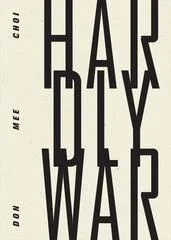

Hardly War
UK & Europe: available from And Other Stories, 2025
Hardly War, first published in the USA in 2016 and finally published in the UK in 2025, splices the personal and political to dizzying effect in a poetry fluid with forms and genres including reportage, memoir, opera libretto, archival photos and drawings. Using artefacts from Choi’s father, a professional documentary photographer during the Korean and Vietnam wars, she explores her paternal relationship and heritage. Here poetry and geopolitics are inseparable twin sisters, conjoined to the belly of a warring empire.
Choi’s KOR-US Trilogy (Hardly War and the subsequent DMZ Colony and Mirror Nation) brings us a new poetic language to learn. Suggestive and subtle in its connections and allusions, there is an exhilarating freedom in its playful form, all while looking straight at the brutality of colonialism and dictatorship.
Reviews:
“This is not a retreat from reality, but a device to expose the colonialist infantilisation and othering that precedes conquest, war crime and genocide. This is a devastating UK debut, speaking its own faint history in its own faint language, and taking us inside a hidden war whose repercussions are still unfolding today.” — by Philip Terry, The Guardian
Choi’s trilogy repeatedly breaks the language of command and hierarchy; Hardly War is filled with muddled military language… Choi’s father is a direct witness to military and police violence, while she engages with the machinations of dominant ideologies and representations, which—like the BBC News—aim to appear “naturally convincing” so as to lodge themselves in everyday life and receive an easy embrace. — Alan Gilbert, e-flux Journal
In “trying to fold race into geopolitics and geopolitics into poetry,” Choi succeeds mightily. The book, divided into three sections—“Hardly War,” “Purely Illustrative,” and “Hardly Opera”—is a collage of reproduced photographs, musical scales, and formally innovative poems. PW
"Deliberately and excitingly difficult in both its style and its subject matter, Don Mee Choi’s second collection, “Hardly War,” sees its author operating as an archaeologist as much as a poet. Choi’s use of hybrid forms — poetry, memoir, opera libretto, images and artifacts from her father’s career as a photojournalist in the Korean and Vietnam Wars — lets her explore themes of injustice and empire, history and identity, sifting through the detritus of family, translation, propaganda and dislocation." -- by Kathleen Rooney in NYTIMES Book Review
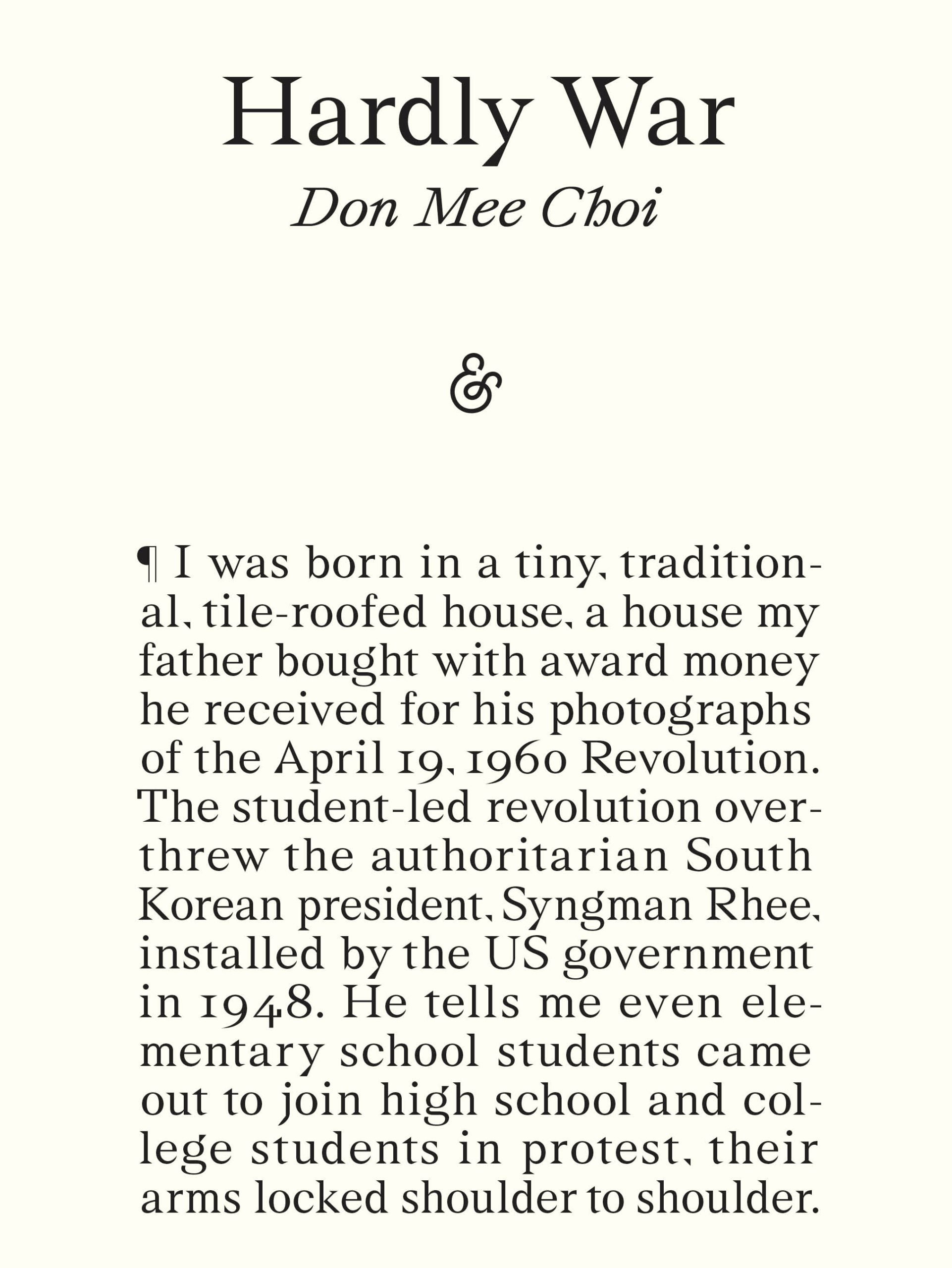
The Morning News Is Exciting
Published by Action Books (2010)
"Cameraman, run to my twin twin zone. A girl's exile excels beyond excess. Essence excels exile. Something happens to the wanted girl. Nothing happens to the unwanted girl. The morning news is exciting." A debut volume from poet, translator, artist and activist Don Mee Choi. Here translation, aberration, mobility and movement corrupt the would-be verities of the world's hegemonic codes.
Paul Cunningham made a film of my poem: "Twin Flower, Master, Emily," read by poet Valerie Mejer Caso, translated by Valerie Mejer Caso and Josefa Gonzalez.
Reviews:
“The Morning News is Exciting blends provocative politics with urgent writing.” – Lily Hoang, HTMLGIANT, July 2010
“The various forms throughout the different sections are woven with many disparate sources, including books regarding South Korea/ U.S. relations, and quotes from Spivak, Deleuze and Guattari, Fanon, Dickinson and Freud. The author herself slides skillfully out of one guise and into another. This variation presents an oblique solution to the problem of Empire as the one. Its welcome antithesis is here in shape-shifting multiples.” – Caitie Moore, Cutbank Reviews, Nov 2010
Don Mee Choi’s first book of poetry, The Morning News Is Exciting, is a seriously inventive manipulation of language, line, and sentence, grappling with divisions created by war and imperial conquest. Choi delves deeply into questions of translation, violence, and the potential for beauty in a gruesome world. – John Pluecker, The Quarterly Conversation, June 2011
“Choi translates feminist politics into an experimental poetry that demilitarizes, deconstructs, and decolonizes any master narrative.” – Craig Santos Perez
"In this book, Choi transits and translates the doubleness of self, kin, home and nation shattered by past colonialism and by continuing imperialism and capitalist predation." - Minnie Bruce Pratt
"‘Follow orderly obsessions’, one of Choi’s poems commands: these obsessions are war, language, translation, dislocation." - Dougal McNeill, Overland
"In The Morning News, language’s loaded relationships with empire, discourse, and gender can never be broken, only twisted and subverted." - Joel Scott, Cordite






Poem is from The Morning News Is Exciting
Film by poet & translator Paul Cunningham. Read by poet-artist-translator Valerie Mejer Caso.